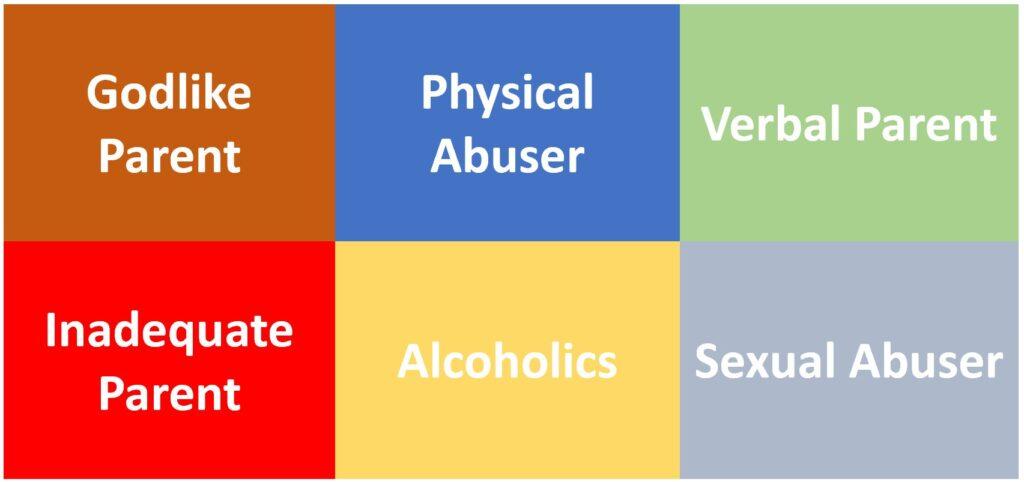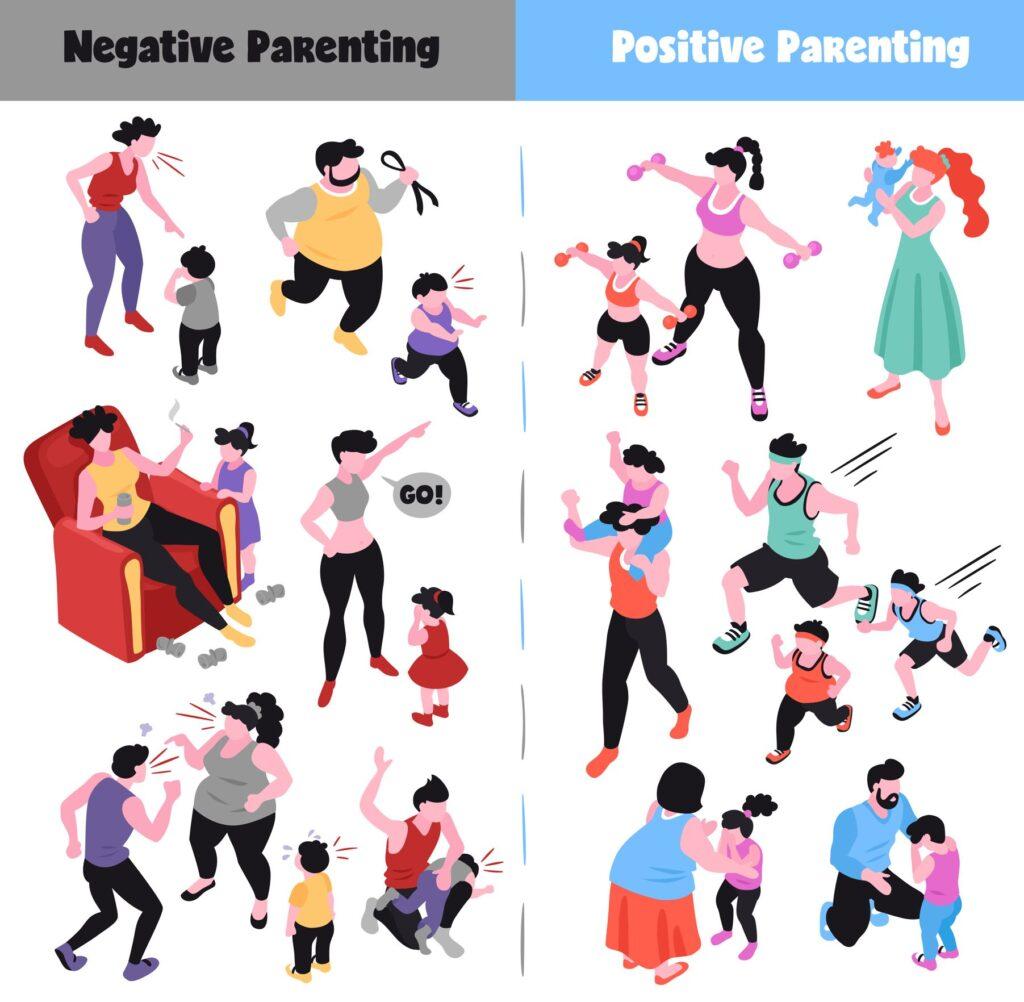It is the parent’s job to create a safe, respectful, and full of love environment for our kids. However, things are changing, and no one is perfect. You may be stressed, upset, and helpless, so your parenting way goes rude, overreacting, and impatient with your kids. That can happen; everyone has this moment. However, if this behavior becomes a pattern, that can cause guilt, fear, or obligation that can negatively shape kids’ life. Then it is toxic parenting, which indicates that you consistently put your own needs rather than caring for your kids and neglect or deny it is wrong.
Related topic:
- 8 Best Positive and Gentle Parenting Books for Toddlers’ Parents
- The Pragmatic Tips of Being a Single Parent
- What to Do When Family Members Hurt You
Table of Contents
What’s Toxic Parenting?
According to Macquarie University’s Children and Families Research Centre research, a surprising number of parents can be considered toxic; 14% of fathers and 22% of mothers have unhealthy relationships with their children. Do you think you’re dealing with a toxic parent? In this article, we want to help you recognize signs of a toxic parenting and how to deal with it.
Dr. Susan Forward, in her book “toxic parents,” indicates that parents mistreat their children while carrying a promise of love and care. A toxic relationship is harmful to either party involved, and this type of relationship puts you in danger, either physically or emotionally. Often, the toxic parent is under the name of goodwill, such as they are involved in every aspect of your life because they try to protect you.
There are three general characteristics of a toxic parenting relationship:
- One-sidedness: In a healthy relationship, both parties feel they are being heard and meeting their needs. In a toxic relationship, however, one person always feels like they are not the priority.
- Imbalance of power: Both parties usually feel they have an equal say. In a toxic relationship, one person always feels like they are being controlled by the other.
- Lack of respect: When a healthy relationship, both parties feel equally treated. In a toxic relationship, one person always feels like they are being disrespected or belittled by the other.
The Typical Toxic Parent’s Type
The godlike parents overprotect their kids till kids cannot survive on their own. The inadequate parents are focused on their survival and neglect their kids. The verbal parents set the example of perfectionism by directly insulting their children and putting them down. The physical abusers are often the male who physically abuse their kids when they don’t meet their needs. However, if a parent is a witness but does nothing to protect the kids, she is also a physical abuser passively. The alcoholics can do everything mentioned above. Even worse, they use alcohol as a catalyst and excuse. The sexual abusers destroy the child’s innocence and make them feel dirty, damaged, and different.
Related topic:
- 7 Old-fashioned Discipline Techniques You Should Avoid At All (on primary school kids)
- How to Keep Your Child Safe: 8 Pedophile (Child Molester) Warning Signs
- Prevent Kids from Bullying: A Complete Guide for Young Schoolers’ Parents (5 to 8 years)

How Can a Toxic Parenting Relationship Affect Kids?
A toxic relationship with your parent can have a lasting effect on a kid’s life as Adverse Childhood Experience (ACEs). CDC has listed a complete graph on the impact. We listed some examples:
- Lack self-confidence as you were constantly put down and made to feel like you were never good enough.
- You don’t trust people because you’re afraid they will hurt you as your parent did.
- You have a hard time being assertive as you are used to having someone else be in control. You’re used to being the one that has to give in, so it’s hard for you to stand up for yourself.
- You’re people-pleasing. People in toxic relationships often spend a lot of time trying to please their parents. For you, it’s a habit at this point. You find yourself constantly trying to make other people happy instead of focusing on what would make you happy.

Toxic Parenting Signs
Now we know what a toxic relationship is and how it can affect you. Let’s look at some signs that a toxic parent raised you.
One typical example is the story of Artist L. S. Lowry, who lived with his overbearing mother, Elizabeth, until she died. His mother tries to dissuade her bachelor son from pursuing his artistic ambitions while never failing to voice her disappointment in him.
1) Overly controlling
We shape ourselves by trying and error, learning from mistakes. A toxic parent thinks it is easier to tell you the “right” direction and go for it. They doubt their kids’ abilities and manipulate them with care, threats, and guilt. To the extreme, some parents want to know where you are at all times and who you are with. Trying to control your every move is her way of feeling like they have the power in the relationship. Even when kids become adults, they refuse to accept that kids can have an independent identity and can make their own decisions.
Over-controlling often comes with a lack of privacy, especially when kids grow older. The parent might read kids’ diaries and log in to kids’ social media accounts or enter your room without knocking on the door. In specific ways, it is necessary due to the increasing cyberbullying cases. However, everyone deserves proper communication upfront and a quiet, alone space to process your day.
2) Always criticize or label your kids in public
Have you ever met parents dragging a kid that stole candy to the cashier and asking kids to apologize and pay for the candy? Do not get me wrong, those parents I admire are trying to correct kids’ behavior by over-extracting it so they never do it again. What I mean here is the behavior that subjectively criticizes everything your kids engage in. For example, she can say, “John underperforms because he is super lazy.” Sometimes the criticism comes as a hurtful joke.
3) Negative attitude
Toxic parents aren’t just negative about their kids. And they’re often pessimistic about everything. They will typically voice this to their kids, which can lead to more stress for the child.
4) Parent feelings were more important than yours
In a healthy relationship, both parties feel their needs are met. On the other hand, toxic parents only care about their own needs. Your feelings and needs always came second to hers. Often, during arguments, she would gaslight you and make you feel like your feelings were invalid.
5) Toxic parenting often passive-aggressive
Toxic parents are often passive-aggressive towards their children. That creates an atmosphere of fear in the home. If she’s mad at you, she won’t just come out and say it. Instead, she’ll give you the silent treatment or find other ways to passive-aggressively punish you.
6) You have lacked support
A toxic parent will never give you the emotional support that you need. Whenever you had a problem or needed someone to talk to, she was never there for you, and it felt like you were always dealing with your issues alone. It’s cliché, but it’s true: children require your presence more than presents. Parents constantly staring at their phones or too busy and stressed out to emotionally support their children are not fostering their child’s emotional development.
7) She demanded a lot of praise
Every child craves their parent’s approval, but when dealing with a toxic relationship, the roles are reversed. If your parent constantly wanted you to praise her and tell her how great she was, it’s a sign that your parental relationship was toxic.
8) Whenever she was mad, it was your fault
Typically, both parties are to blame when there’s conflict in a relationship. However, that’s not how a toxic parent operates. In her mind, everything is always your fault, and if she’s mad, it’s because of something you did. For example, if she is constantly upset about a dirty house, she will likely blame you for the mess, even if you are only part of the reason.
9) She used guilt to manipulate you in the name of love
A parent with toxic tendencies will use your guilt to manipulate you into doing what she wants. For example, she might guilt you into sacrificing her career to raise you. They often twist the truth and portray themselves as the ‘good parent or perfect victim’ to achieve their goal.
10) They make mountains out of molehills.
Every little act drives them crazy, and they are good at creating a big problem from a small one. Such parents cannot prioritize things, so they harp on every little thing. They often raise anxious children. These are usually the same parents who treat everything that goes wrong like a life or death matter.
How to Stop Being a Toxic Parent?
If you noticed the above signs are happening more often in your house, the following strategies you can try to improve the situation. Remember, it will not damage your relationship with kids if it happens occasionally. Parents with self-awareness and a developing mindset will finally achieve a good relationship with their kids.
1) Find out the reason & take care of yourself
Are you too tired or overpromised? If you are stressed, it often leads to an impatient and easy loss of temper. Once you find the source, try to get help. Taking care of yourself means eating healthy, exercising regularly, and allocate “me time” that energized yourself.
2) Respect kids’ choices & let them make mistakes
Kids do not belong to us. One of the parents’ missions is to respect their independence and let them fulfill their dream. Support them whenever needed, help them learn their lessons, and cheer for them.
3) Honest and open conversation
Have regular meetings with kids to discuss their lives and what kind of support they need. It would be great if the conversation became part of the family routine. Kids can discuss many things during routine time with your full attention.
4) Let kids take responsibility
Giving kids age-appropriate responsibilities can help them build self-confidence. Meanwhile, if they can help you with housework, such as cleaning up their bedroom and the bathroom, that will make your life much easier.
5) Understand the difference between criticizing and correcting
Parents meant to be a guide. Teach your child a work ethic and help build their academic skills – setting a goal can motivate them to try harder. While personal insults and criticisms can break their spirit and make them want to give up, correction strengthens the will and opens the door for positive reinforcement.
How to Deal with a Toxic Parent
You cannot escape the parenthood relationship if you have a toxic parent. Then how to effectively manage the connection to preserve your emotional health?
1. Establish and adhere to boundaries
Set clear boundaries and limit contact with your parents to keep your time together positive and healthy. When you need to meet them, choose a public space that allows you to leave if they do not respect your boundaries, and it also creates a neutral environment where you are less likely to fall back into old behavior patterns.
2. Be gentle with yourself
It is not necessary for you to spend every holiday with your parents. Instead, spend time with people who make you feel good about yourself and encourage you to keep being the wonderful person you are.
Final Thoughts from Pragmatic Lifestyle
A healthy parenting method includes acknowledging kids’ feelings, supporting their decisions, opening conversation, and apologizing when making mistakes. However, some families went beyond the thin line and became more critical, overcontrolled, and abusive environments.
Here we listed the signs of toxic parenting styles, as well as suggestions for how to improve the situation if you are a parent or a child (when you grow up). If you find it too much to handle on your own, seeking help from the community, positive friends, or a professional therapist is critical.
About Me
Hi, there, I am Lin. Together with husband and two kids, we live in the beautiful Netherlands in Europe. I am dedicated for self development, create quality time for the whole family, and fully support kids with their potentials and possibilities.






2 Comments
Comments are closed.